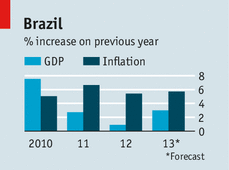ALMOST exactly 20 years ago, in May 1993, Fernando Henrique Cardoso was named as Brazil’s 13th finance minister in as many years, a seemingly hopeless job in a country trapped in hyperinflation, debt and an anachronistic economic statism. Mr Cardoso’s Real Plan swiftly tamed inflation and took him to the presidency. There he laid the foundations for a new Brazil, of stability and liberal economic reform. This success was reinforced by his successor, Luiz Inácio Lula da Silva, a left-wing former union leader, whose government saw 30m Brazilians get out of poverty.
Mais
Economia

- The New Yorker - Dilma Rousseff.
A reporter at large about Brazilian President Dilma Rousseff. Until recently, Brazil has been one of the most uneducated, economically imbalanced countries in the world. Now its economy is growing much more rapidly than that of the U.S. Twenty-eight...
- A Queda Do Brasil
Brazil’s terrible fall from economic grace S&P’s decision to downgrade the country’s debt to junk is a warning ©Dreamstime If Brazil was a hospital patient, emergency room doctors would diagnose it as being in terminal decline....
- Previdência
— BRAZIL: Brazil is ranked second-best of 20 countries evaluated by the Center for Strategic and International Studies for maintaining retirees' incomes. But it's only No. 18 in its ability to pay for its retirement system over the long term....
- O Futuro Do Brasil
Brazil’s future Has Brazil blown it? A stagnant economy, a bloated state and mass protests mean Dilma Rousseff must change course Redeemer ascending like a rocket from Rio de Janeiro’s Corcovado mountain, under the rubric “Brazil takes off”....
- Conseguirá O Brasil Evitar Sua Argentinização?
Para Sebastian Edwards, o mundo conseguiu evitar a "argentinização" ao longo da crise financeira. A Argentina, ao contrário, continua "argentinizando". Conseguirá o Brasil escapar desta maldição? "But the most important question is what will happen...
Economia
PIB e inflação no Brasil - o que cresce?

Brazil’s mediocre economy
A fall from grace
How to squander an inheritance—and how easily it could be restored
loading...
- The New Yorker - Dilma Rousseff.
A reporter at large about Brazilian President Dilma Rousseff. Until recently, Brazil has been one of the most uneducated, economically imbalanced countries in the world. Now its economy is growing much more rapidly than that of the U.S. Twenty-eight...
- A Queda Do Brasil
Brazil’s terrible fall from economic grace S&P’s decision to downgrade the country’s debt to junk is a warning ©Dreamstime If Brazil was a hospital patient, emergency room doctors would diagnose it as being in terminal decline....
- Previdência
— BRAZIL: Brazil is ranked second-best of 20 countries evaluated by the Center for Strategic and International Studies for maintaining retirees' incomes. But it's only No. 18 in its ability to pay for its retirement system over the long term....
- O Futuro Do Brasil
Brazil’s future Has Brazil blown it? A stagnant economy, a bloated state and mass protests mean Dilma Rousseff must change course Redeemer ascending like a rocket from Rio de Janeiro’s Corcovado mountain, under the rubric “Brazil takes off”....
- Conseguirá O Brasil Evitar Sua Argentinização?
Para Sebastian Edwards, o mundo conseguiu evitar a "argentinização" ao longo da crise financeira. A Argentina, ao contrário, continua "argentinizando". Conseguirá o Brasil escapar desta maldição? "But the most important question is what will happen...
